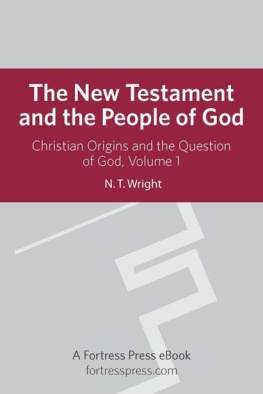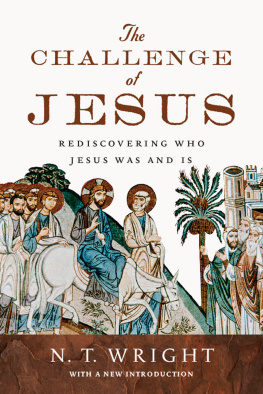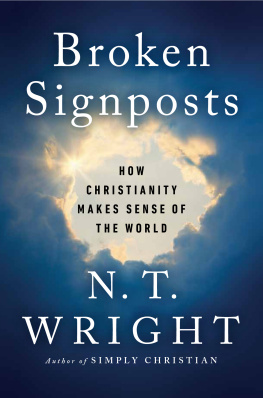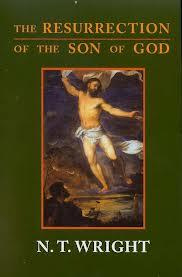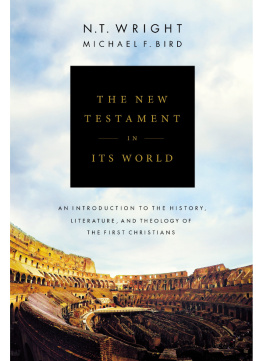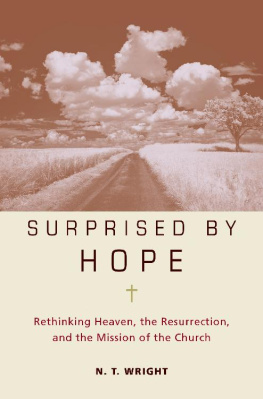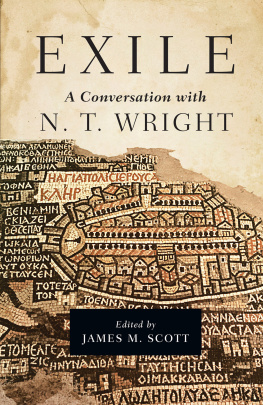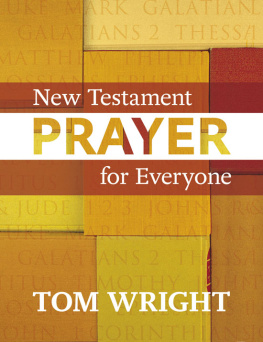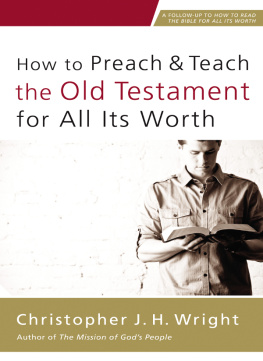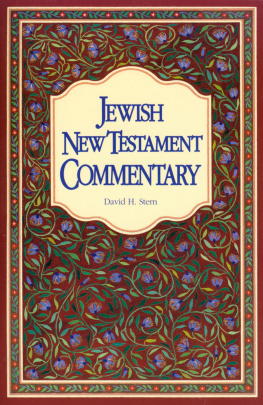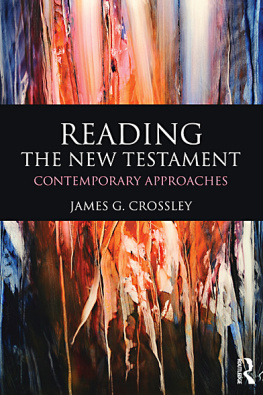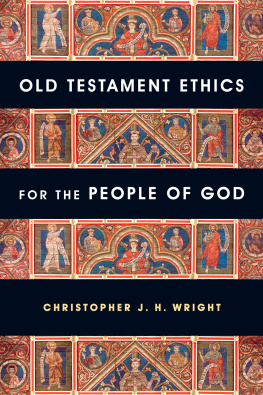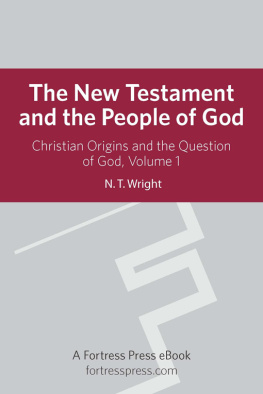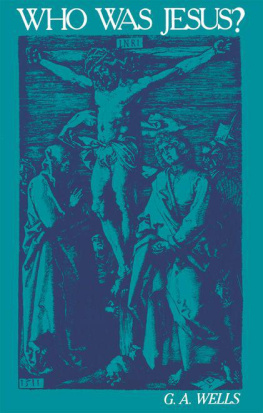CHRISTIAN ORIGINS AND THE QUESTION OF GOD
Volume One
THE
NEW TESTAMENT
AND THE PEOPLE OF GOD
N.T. Wright

First published in Great Britain 1992
Society for Promoting Christian Knowledge
36 Causton Street
London SW1P 4ST
Copyright Nicholas Thomas Wright 1992
All rights reserved. No part of this book may be reproduced or transmitted in any form or by any means, electronic or mechanical, including photocopying, recording, or by any information storage and retrieval system, without permission in writing from the publisher.
Unless otherwise stated, biblical quotations are from the New Revised Standard Version of the Bible, copyrighted 1989, and are reprinted by permission of the National Council of the Churches of Christ in the USA.
British Library Cataloguing in Publication Data
A catalogue record for this book is available from the British Library
ISBN 978-0-281-04593-8
for Brian Walsh
CONTENTS
For some years I tried to write two books side by side: one about Paul and his theology, the other about Jesus within his historical context. It gradually dawned on me that the two belonged together more closely than I had realized. Both were concerned with the historical description of events and beliefs in the first century. Both emphasized a particular way of understanding the relevant texts and events. Both required a pre-understanding of first-century Judaism. Both demanded concluding theological and practical reflections. So it was that I found myself driven to think of a two-volume work on Jesus and Paul.
But the material, and the nature of the arguments I wished to advance about it, would not let me leave it at that. One of the vital questions that has to be asked as part of the search for Jesus has to do with the gospels as they stand, and the enormous problems raised there could hardly be dealt with in a single chapter somewhere within an already over-long book. Having given in, and admitted to myself that I was thus planning three volumes, it was only a short step to the realization that I was actually thinking of five: one each for Jesus, Paul, and the gospels, and an introduction (the present volume) and conclusion in which the various things that would otherwise have to be said at the beginning and end of each of the other three books could be gathered together. The result is a project which, though still focused centrally on Jesus and Paul, is also inevitably about the New Testament as a whole.
One reason for allowing the material to expand in this way is the frustrating brevity of so many one-volume, or even two-volume, New Testament theologies in the present century. To compress the discussion of the parables, or of justification, into two or three pages is actually not much use either to the ordinary reader or to the advancement of scholarship. At best, all one can hope to do by that method is to set a few bells ringing and see if any listeners want to go away and work out what they might mean. I hope to do a little more than that, and actually to address substantial issues, and engage in debate with opposing views, at certain key points.
At the opposite extreme from the brief overall survey is the fragmentation which exists in so much of the discipline, whereby people spend entire professional careers specializing in one sub-area, and never try to draw together the threads of wider hypotheses. I believe it is important that the synthesis be attempted, but without false compression or over-simplification. I hope, then, to offer a consistent hypothesis on the origin of Christianity, with particular relation to Jesus, Paul and the gospels, which will set out new ways of understanding major movements and thought-patterns, and suggest new lines that exegesis can follow up. I hope to contribute to this task myself.
The phrase New Testament theology, which I discuss in the first chapter of the present volume, is in the present day loaded with a variety of connotations. Although in many ways what I am doing falls into the pattern of books with titles like that, I have preferred to leave the main title of the project concrete rather than abstract. One of the underlying themes throughout is the meaning of the word God, or for that matter god (see below), and it seems to me that the early Christians, including the writers of the New Testament, wrestled with that question more than is usually imagined. The word theos for Greek-speakers (and its equivalents in other languages spoken in the first century) was not univocal, and the early Christians made out a fairly thorough case for understanding it in a particular sense. I am therefore not merely investigating the general area of theology (i.e. anything that passes for theological reflection on any subject), but wish to focus particularly on theology properi.e. the meaning and referent of the important word god. This has, perhaps surprisingly, been somewhat neglected within New Testament theology, and it seems to me high time that the situation was rectified.
There are five matters of linguistic usage on which I must comment, and either apologize for or, perhaps, explain why apology should be unnecessary. First, I normally refer to Jesus as Jesus, not simply Christ, as did many older writers. This is not simply to avoid offending my Jewish friends, and others for whom Jesus Messiahship is a matter of debate. It is because Messiahship is itself in question throughout the gospel story, and the task of the historian is to see things as far as possible through the eyes of the people of the time. In particular, it may serve as a reminder that Christ is a title with a specific, and quite limited, meaning (see the discussions in volumes 2 and 3). It was not of itself a divine title, however much it has been used as such in Christian circles, and was not in earliest Christianity reducible to a mere proper name.
Second, I have frequently used god instead of God. This is not a printers error, nor is it a deliberate irreverence; rather the opposite, in fact. The modern usage, without the article and with a capital, seems to me actually dangerous. This usage, which sometimes amounts to regarding God as the proper name of the Deity, rather than as essentially a common noun, implies that all users of the word are monotheists and, within that, that all monotheists believe in the same god. Both these propositions seem to me self-evidently untrue. It may or may not be true that any worship of any god is translated by some mysterious grace into worship of one god who actually exists, and who happens to be the only god. That is believed by some students of religion. It is not, however, believed by very many practitioners of the mainline monotheistic religions (Judaism, Christianity, Islam) or of the non-monotheistic ones of the present volume.)
It seems to me, therefore, simply misleading to use God throughout this work. I have often preferred either to refer to Israels god by the biblical name, YHWH (notwithstanding debates about the use of this name within second-temple Judaism), or, in phrases designed to remind us of what or who we are talking about, to speak of the creator, the covenant god or Israels god. The early Christians used the phrase the god ( ho theos ) of this god, and this was (I believe) somewhat polemical, making an essentially Jewish-monotheistic point over against polytheism. In a world where there were many suns, one would not say the sun. Furthermore, the early Christians regularly felt the need to make clear which god they were talking about by glossing the phrase, as Paul so often does, with a reference to the revelation of this god in and through Jesus of Nazareth. Since, in fact, the present project presents a case, among other things, for a fresh understanding of the meaning and content of the word god, and ultimately God, in the light of Jesus, the Spirit and the New Testament, it would be begging the question to follow a usage which seemed to imply that the answer was known in advance. I think it quite likely that many of those who come to a book like this with the firm conviction that Jesus is God, and equally well many of those who come with the firm conviction that he is not, may hold views on the meaning of god, or God, which ought to be challenged in the light of the New Testament. The christological question, as to whether the statement Jesus is God is true, and if so in what sense, is often asked as though God were the known and Jesus the unknown; this, I suggest, is manifestly mistaken. If anything, the matter stands the other way around.
Next page
